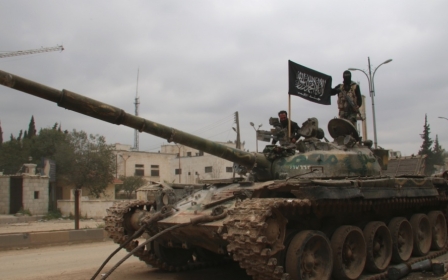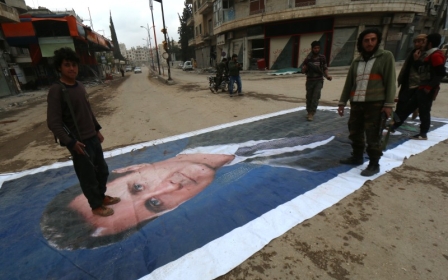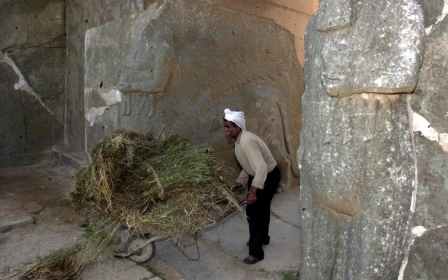The emergence of IS in southern Syria

Violent clashes broke out on Tuesday morning between Syrian opposition fighters, including the Free Syrian Army (FSA) and al-Nusra Front, and an Islamic State (IS) group cell operating as the Jihad Army in Quneitra, southern Syria.
The violence comes a day after Jihad Army militants ambushed and killed six FSA fighters in Quneitra on Monday. At least 20 others were arrested and are now being held by the group. The men were on their way to the frontline where they have been battling Syrian government forces in Quneitra.
Sources within the FSA said the Jihad Army group set up several barriers and checkpoints near the towns of Qahtaniya, Hamidiya and Adnaniya, in the countryside of Quneitra. Shortly after, an FSA faction from the city of Nawa in the Deraa province drove through the area and was caught up in the trap.
Six men were killed, and four injured men fled the scene. Militants from the Jihad Army pursued the injured men, but were not able to catch them. In the melee, all of the FSA vehicles were captured, many loaded with weapons and ammunition.
"The Jihad Army swore allegiance to Daesh [the Islamic State militant group, or IS] and they have dominated the town Qahtaniya. They have established a number of military checkpoints nearby," said Abu Yahya, an official with the activist-run Media Office for the Furqan Brigades, part of the FSA's Southern Front:He added: "The Jihad Army killed a group of FSA members and wounded four others, and arrested 20 fighters from the FSA's Southern Front and other factions. They have surrounded the Crossing Field Hospital near the town of Qahtaniya, southwest of Quneitra."
Activists from Deraa and Quneitra told Middle East Eye that members of the Jihad Army stopped a car belonging to the Nawa FSA fighters that was loaded with ammunition and on its way to the village of Hamidiya. Among the six men killed was Captain Samer Suwadani, a brigade commander from the Ahrar Nawa squad, and Abu Saher, a commander of the first corps.
First IS presence in south
This incident marks the first time members of IS have made their presence known in southern Syria. Even as the group has blitzkrieged through eastern and northern parts of the country, the south has largely remained immune - until now.
On Tuesday morning, hours after the attack, the courthouse in Deraa, one of the region's top authorities, issued a statement calling on all militant factions who were signatories to the charter in the southern region to eliminate the Jihad Army in Quneitra and "beat it with an iron fist". It asked for signatories to deliver the group's leaders to the courthouse for prosecution, and added that the Jihad Army has attached "takfiri labels" to the FSA, calling them traitors, apostates and the enemies God.
In addition to accusing the Jihad Army group of killing and capturing the FSA fighters, the courthouse statement accused them of preparing to launch a wide-scale military operation to take control of Syrian Arab Army sites in Quneitra. The emergence of the Jihad Army as an IS sleeper cell had the deliberate effect, the statement continued, of impeding opposition military action against the government.
By mid-morning on Tuesday, Southern Front factions were braced for battle against the Jihad Army group, with some of the larger factions issuing statements as to their intent. Militants from al-Nusra Front, the Islamic group Ahrar al-Sham, the FSA's Yarmouk Army, First Army, Ahrar Nawa and the broader Southern Front assembled in Quneitra and began fighting around 11am local time (8am GMT).
In a statement published by the Islamic Ahrar al-Sham movement on its official website, the group first moved into the Adnaniya area and several locations in Qahtaniyah area where the Jihad Army was known to be holed up. By late afternoon, it said dozens of militants from the Jihad Army had been killed or wounded.
The statement added that this military operation came in response to a request from the courthouse in Deraa, which had demanded a collaborative military response to the Jihad Army.
As of 11PM (8PM GMT) local time, fighting was ongoing between the FSA's Southern Front, al-Nusra Front, and local Islamic movements on the one side, and the Jihad Army on the other. According to activists, the Jihad Army's Emir, or leader, Abu Musab al-Fanousi, was injured in fighting.
Origins of JIhad Army near Golan
The village of Qahtaniyah is adjacent to the border with the Israeli-occupied Golan Heights. It is the main stronghold of the Jihad Army: all of the group's fighters are locals, Syrians from Qahtaniya and Hamidiya. Most are thought to have joined the group in January 2015. Previously, members were active with local Islamist groups such as Saraya Jihad, Jund al-Islam, the Mujahideen of al-Sham, and a youth militant group.
The Jihad Army has not officially announced its loyalty to the IS organisation, and there has been no official comment on the group's affiliation or its actions from IS media. But the group is widely understood to have been supportive of the IS, raising its flags and sharing its ideology on social networks. The group has targeted more opposition groups labelled by many as moderate in the south, taking a “takfiri” stance and calling them "kuffar" (apostates) and "sahawat" (referring to the Iraqi Sunnis who were part of the Sahwa, or awakening, in previous years - essentially, “traitors”).
Some opposition military leaders from Deraa suggested that the Jihad Army's actions this week were calculated to target the media, even as they failed to get any significant traction in the largely rebel-held south. The Jihad Army lacked the military strength to take on the Southern Front, these leaders said.
One FSA commander, speaking to MEE on the condition of anonymity, said he thought the Jihad Army's emergence as a likely IS affiliate and its actions this week may be connected to the armed opposition's military advances across the Idlib province over the past weeks, including its removal of the government from Jisr al-Shughur and the Syrian army camps nearby.
With the government visibly weakening and on the retreat, the group would have a battle on just one front - against the broader opposition – instead of two.
New MEE newsletter: Jerusalem Dispatch
Sign up to get the latest insights and analysis on Israel-Palestine, alongside Turkey Unpacked and other MEE newsletters
Middle East Eye delivers independent and unrivalled coverage and analysis of the Middle East, North Africa and beyond. To learn more about republishing this content and the associated fees, please fill out this form. More about MEE can be found here.




